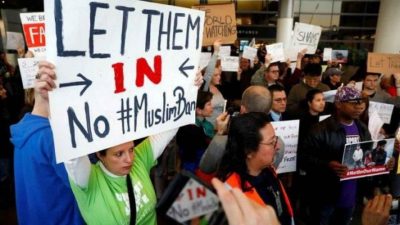Trump Lawyer: There’s No Muslim Ban Because Trump Thinks Islam Is ‘One of the Greatest Countries’
Well, that's a weird defense.

On Wednesday, the Supreme Court heard oral arguments in Trump v. Hawaii, the case against President Donald Trump’s executive order banning nationals of several countries, most of which are Muslim-majority.
In his closing arguments, United States Solicitor General Noel Francisco said that the ban was not targeting Muslims, because Trump actually has praised Islam as “one of the greatest countries of the world.”
“Well, the President has made crystal clear on September 25 that he had no intention of imposing the Muslim ban,” Francisco said, referring to the date that the third version of the ban was signed. “He has made crystal clear that Muslims in this country are great Americans and there are many, many Muslim countries who love this country and he has praised Islam as one of the great countries of the world.”
You can view the full transcript of Wednesday’s hearing here and also listen to Francisco say this at the 1:06:30 mark below.
In Francisco’s defense, this is probably a slip-up. He probably meant to say that Trump has praised Islam as one of the greatest religions of the world.
But still, it’s a slip-up that seems more likely to happen if you truly believe that Muslims are all the same. And regardless, Trump isn’t known for praising Islam as a great and wonderful religion. He’s known for the opposite.
The reason Francisco was trying to make this argument was because since Trump signed the first version of this executive order in January 2017 — just one week after he came into office — a large argument against the ban has hinged on whether or not it is in fact a “Muslim ban,” due to the president’s personal animus against Muslims.
The first version of the ban — the “Protection Of The Nation From Foreign Terrorist Entry Into The United States” — targeted a different set of countries than the one currently in effect. It suspended all nationals of Iran, Iraq, Libya, Somalia, Sudan, Syria, and Yemen for 90 days, until the vetting for these countries was reviewed. If the Trump administration decided that there was still not enough vetting for a select country, that ban could continue. Initial interpretation of this ban also included those with green cards (or permanent residents) and those who already had valid visas, leading to chaos, confusion, and mass protests at airports across the United States. The ban also suspended all refugee resettlement for 120 days and suspended all Syrian refugee resettlement indefinitely.
The second version of the ban — signed in March after the first one was halted by the courts — targeted a slightly different set of countries. Under this version, nationals of Iran, Libya, Somalia, Sudan, Syria, and Yemen would not be able to receive visas to the United States for 90 days. Refugee resettlement would also be suspended for 120 days, and Trump lowered the total number of refugees who would be accepted to just 50,000, less than half of what the Obama administration had planned.
Again, the ban faced legal challenges, leading to the third version of the ban, signed in September. Nationals of Chad, Iran, Libya, North Korea, Somalia, Syria, and Yemen would be targeted (in addition to certain Venezuelan government officials). Chad has since been removed from the list, and virtually no North Koreans visit the United States, so in effect, again, most of the people affected by this ban are Muslim.
The Trump administration has argued repeatedly, including on Wednesday, that the ban was passed on national security grounds. You can read more about the oral arguments and the justices’ line of questioning on Wednesday from my colleague Ian Millhiser.
But throughout all of this, there have been some constants, and they are the statements Trump and his advisers have made. Trump very explicitly campaigned on the promise of banning Muslim immigrants from the United States. In December 2015, he called for the “total and complete shutdown of Muslims entering the United States until our country’s representatives can figure out what is going on.” He also flat out said “Islam hates us.”
Since he came into office, his advisers have also cast doubt on the intentions behind this ban — from then Trump adviser and now Trump lawyer Rudy Giuliani, who claimed that the focus on national origin was a way to do the Muslim ban “legally”, to Steven Miller, who said there are only “minor technical differences” between the first and second version of the ban.
Since the first ban, Trump has admitted that religion was a key factor in creating the ban, and that he would prioritize Christian refugees. He has retweeted Islamophobic videos from a far-right group in the United Kingdom — and then defended doing so, even though at least one of them was fake. He has smeared London’s Muslim mayor, ignored attacks on Muslims, and called for the mass murder of Muslims based on a fable from hoax email chains.
The country of Islam is not real, but if it were, Trump probably would not praise it.

